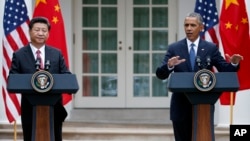Two days after President Obama and Chinese President Xi Jinping held a joint press conference on September 25, Chinese state-run Tibet Radio announced a fabricated quotation of Obama’s remarks from the joint press conference held at the Rose Garden.
“Obama said, the United States will not support the so-called Taiwan independence, Tibet independence, Xinjiang independence and the US will not interfere Hong Kong affairs." Obama may have indicated some aspects of these messages, but they were not words from Obama’s remarks that he made during the joint press conference. What the Chinese media did not mention was that Obama urged Xi Jinping to preserve the Tibetan religion and culture and engage with the Dalai Lama or his representatives.
Scholars familiar to Chinese media coverages in sensitive regions like Tibet didn’t expect that Chinese media would mention the US president raising human rights and Tibet issues, including freedom of press and religion that Mr. Obama said he “affirmed” in meeting with Xi.
“When Chinese official media reports this, of course they only emphasize that the United States, along with most of the countries on earth, recognize China’s territorial claims to the territories that it actually occupies,” says Michael Davis, a professor at the University of Hong Kong, talking to VOA Tibetan service. “And, not to look at critics of Chinese policies regards to those territories.”
Wu’ar Kaixi, political commentator in Taiwan and former Tiananmen student protest leader who was born in Xinjiang, watched the Chinese media coverages in Xinjiang region. He told VOA Tibetan Service that the Chinese media used Obama remarks as an indicator that the United States is with China in the fight against Xinjiang separatists. “In the Uyghur language, the Chinese press is repeating the same message, like United States and the Chinese government are in the same united front line in attacking terrorism and that the U.S. does not support separatism in Xinjiang area,”
Kaixi, who is currently seeking a chair in Taiwan parliament, said that the main messages about Xi Jinping’s trip to U.S. in Chinese media were all about how successful it was.
Tibet Radio also made an announcement that Obama had promised to leave aside the issues that the two counties disagree upon and move forward to work together constructively.
Obama had clearly said that he had raised concerns about cyber-threats, South China Sea territorial disputes issues, and had a “frank” discussion on human rights issues with Xi.
Experts now question how successful the trip actually was for Xi Jinping. Less than two weeks after his meeting with President Obama, the U.S. Navy is now reportedly preparing to send ships inside the territorial limit China claims in South China Sea.





